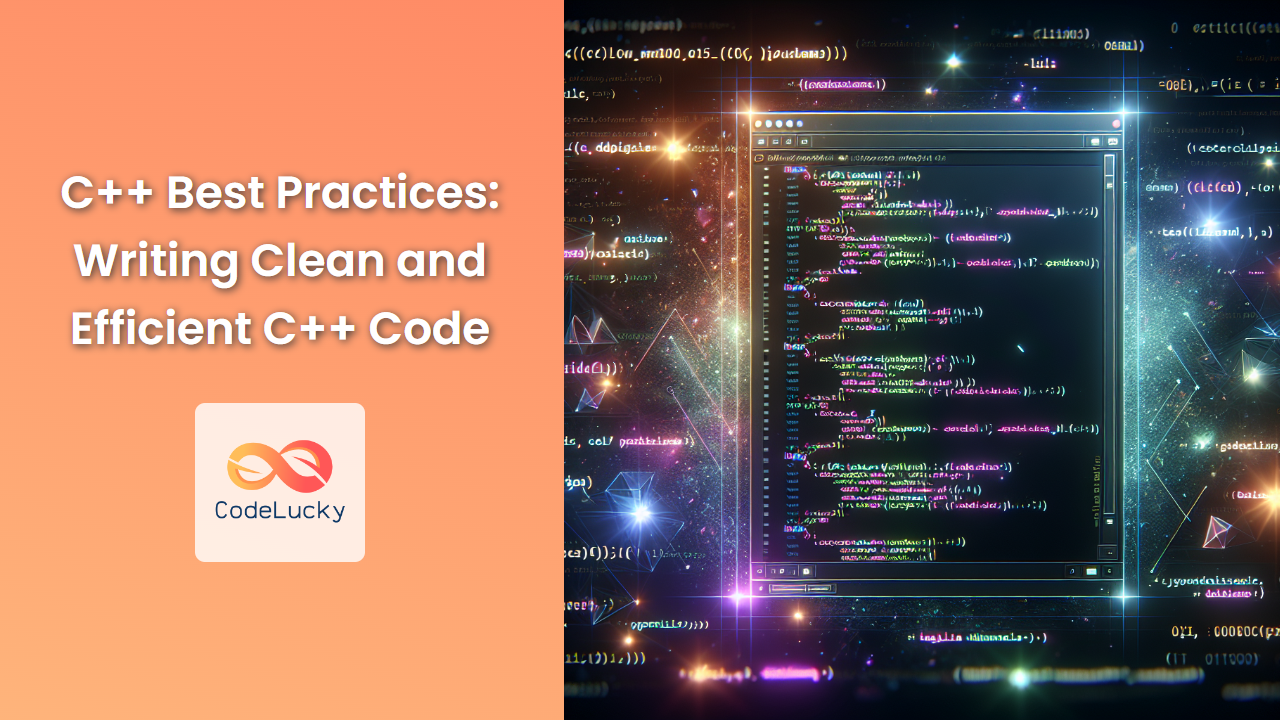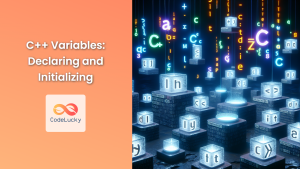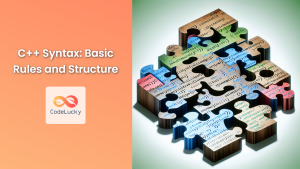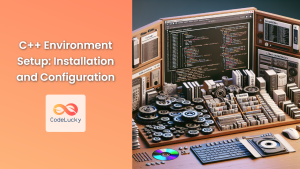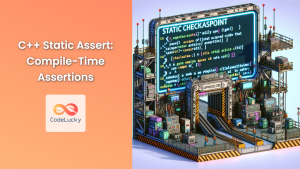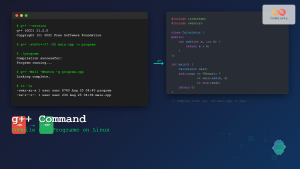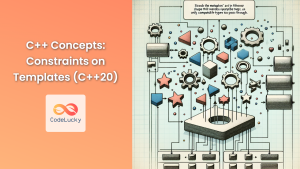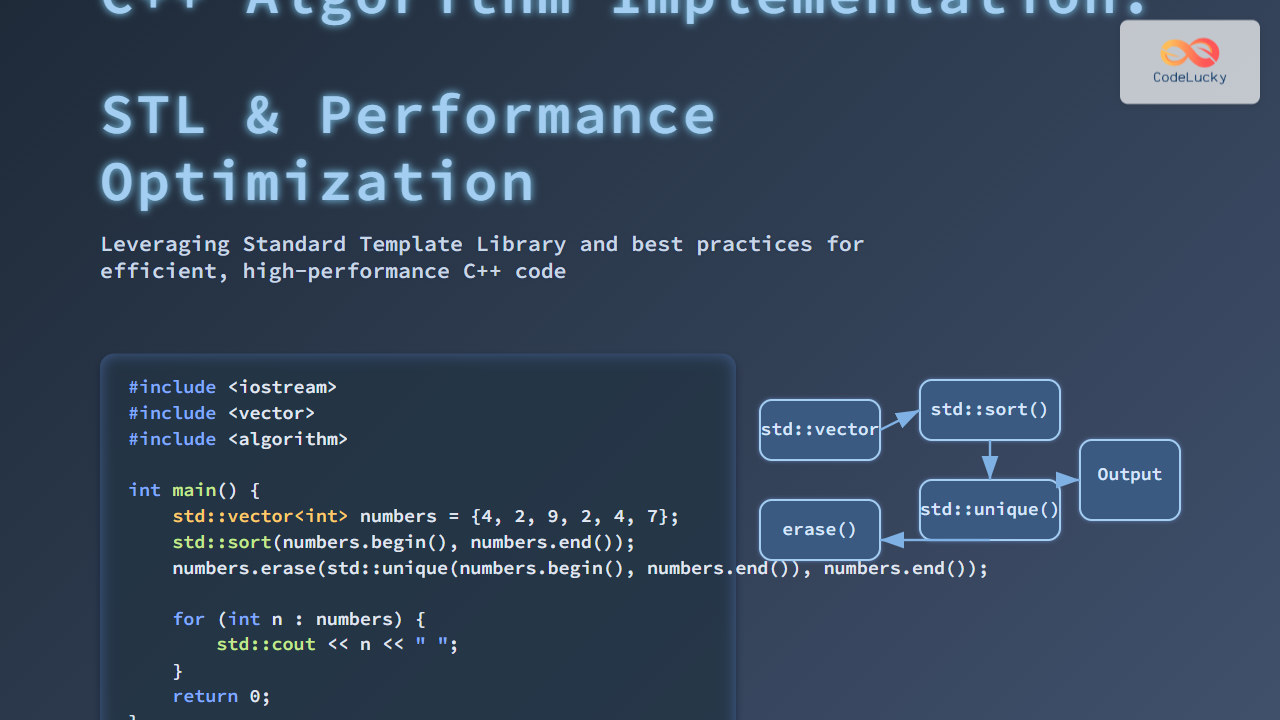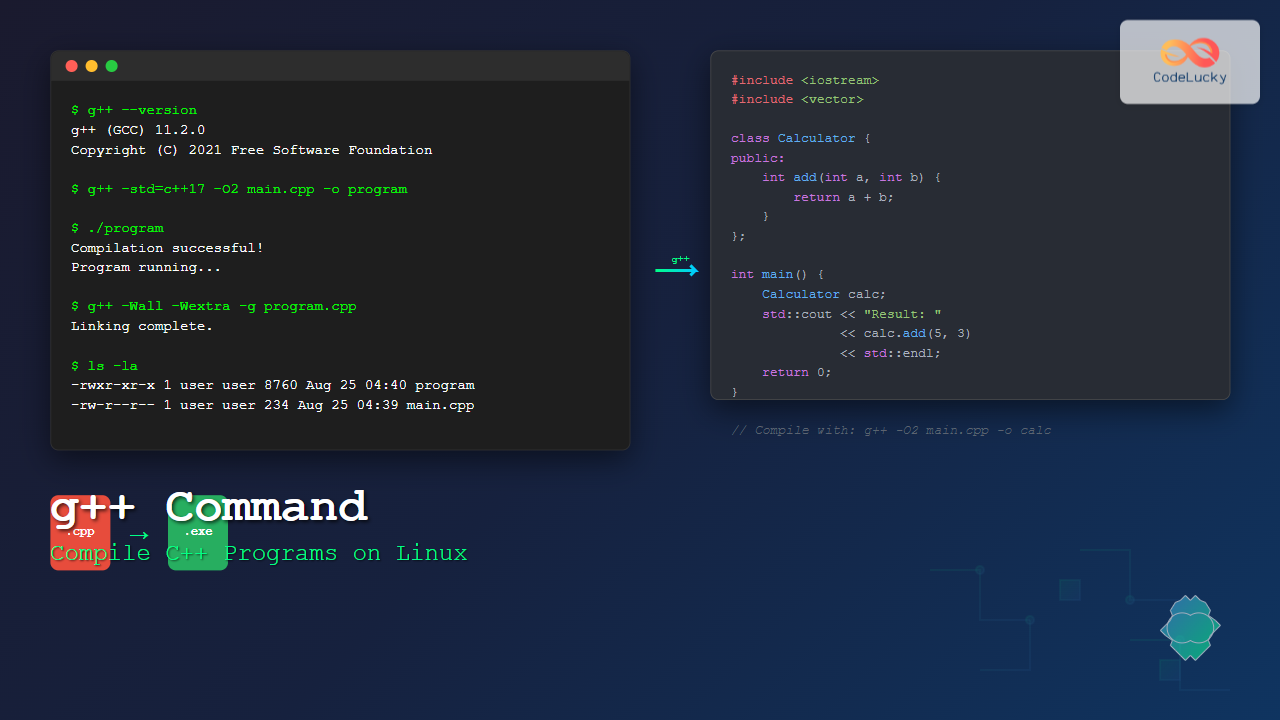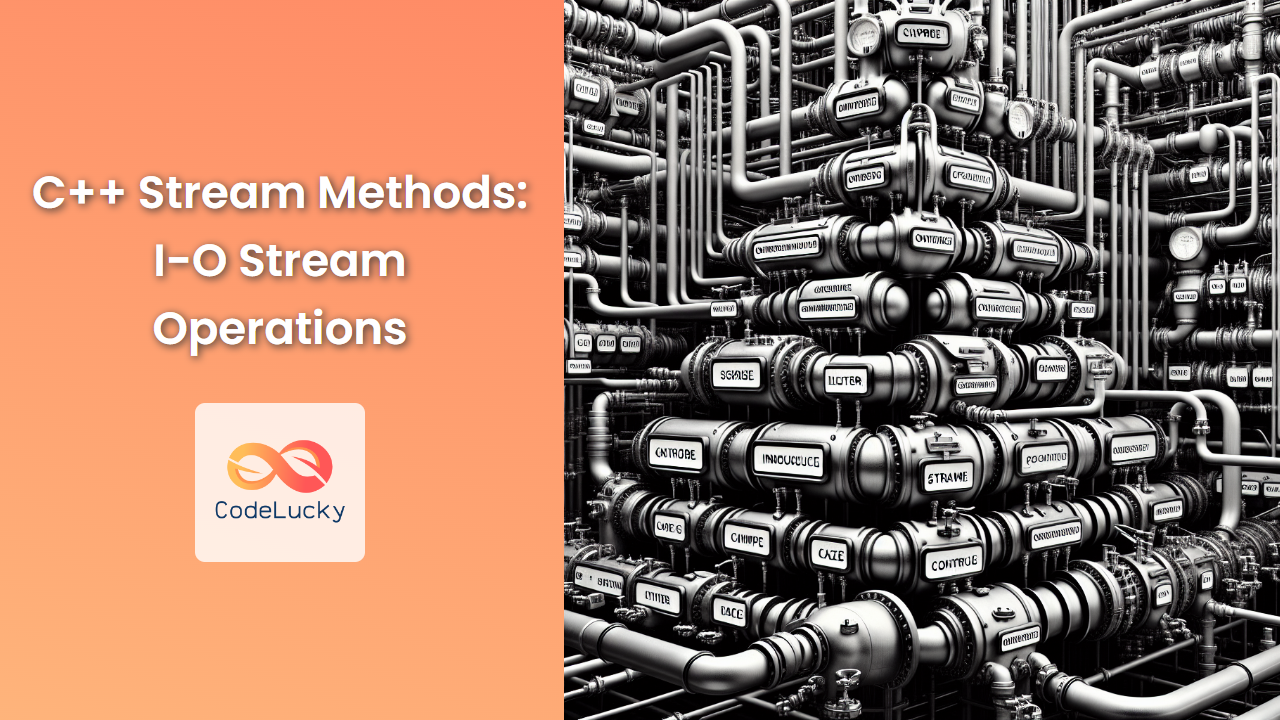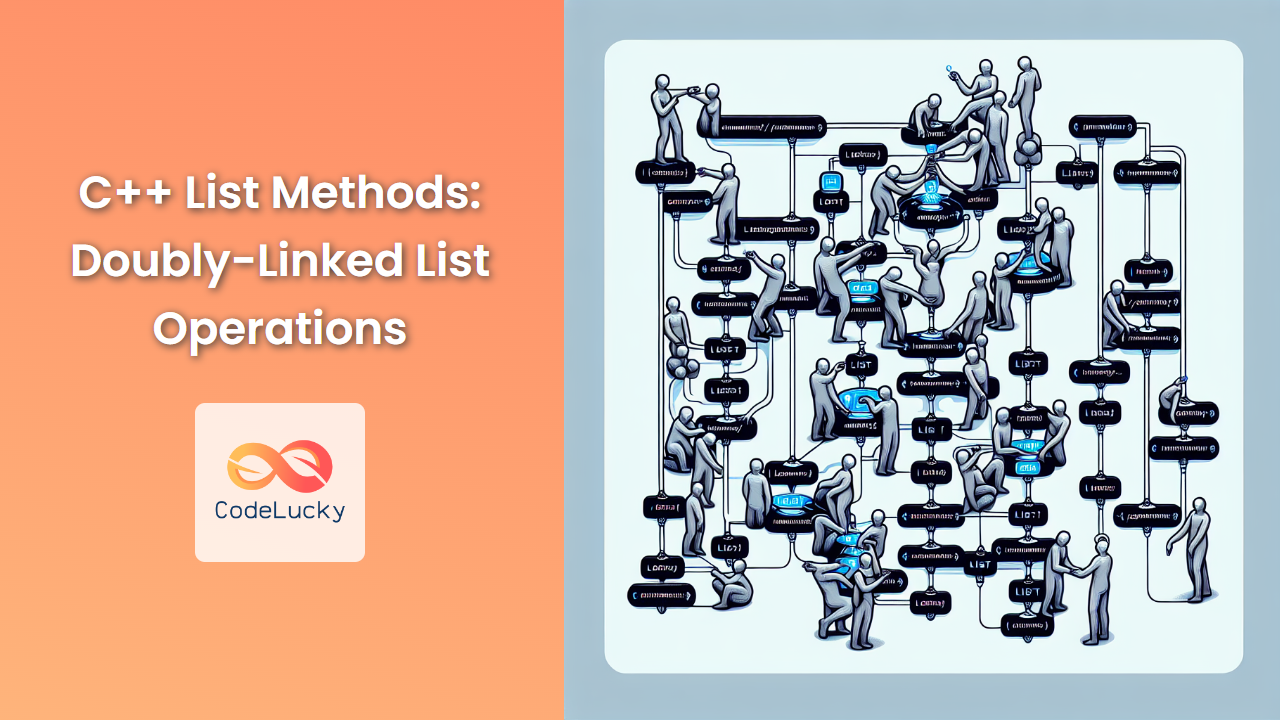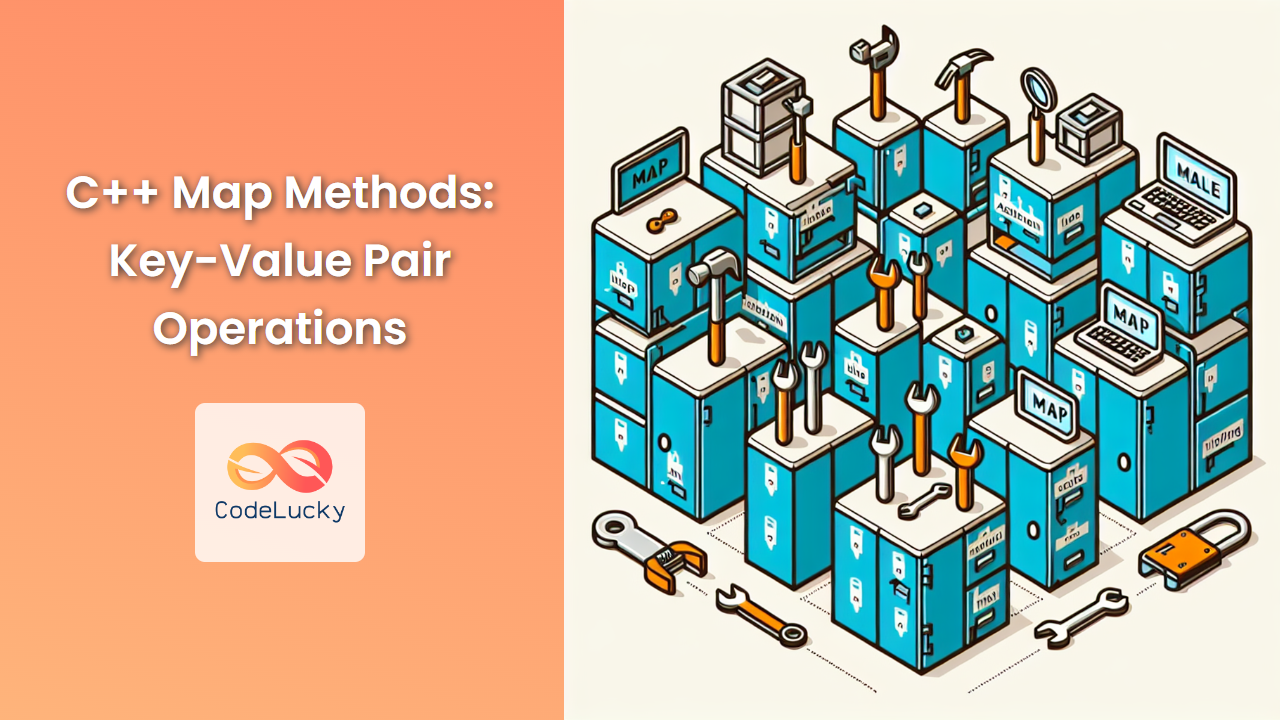C++ is a powerful and versatile programming language, but with great power comes great responsibility. Writing clean and efficient C++ code is crucial for maintaining large-scale projects, improving performance, and collaborating effectively with other developers. In this comprehensive guide, we’ll explore best practices that will help you elevate your C++ programming skills and create high-quality, maintainable code.
1. Embrace Modern C++ Features
C++ has evolved significantly over the years, and modern C++ (C++11 and beyond) offers numerous features that can make your code more expressive, safer, and efficient.
Use Auto for Type Inference
The auto keyword allows the compiler to deduce the type of a variable, which can lead to more concise and maintainable code.
// Instead of:
std::vector<int>::iterator it = vec.begin();
// Use:
auto it = vec.begin();
This not only reduces verbosity but also makes the code more resistant to type changes.
Utilize Smart Pointers
Smart pointers help manage memory automatically, reducing the risk of memory leaks and making ownership semantics clear.
#include <memory>
// Instead of raw pointers:
MyClass* ptr = new MyClass();
// ...
delete ptr;
// Use smart pointers:
std::unique_ptr<MyClass> ptr = std::make_unique<MyClass>();
// No need to manually delete
Smart pointers like std::unique_ptr, std::shared_ptr, and std::weak_ptr provide different ownership semantics to suit various scenarios.
Leverage Range-Based For Loops
Range-based for loops offer a more readable and less error-prone way to iterate over containers.
std::vector<int> numbers = {1, 2, 3, 4, 5};
// Instead of:
for (std::vector<int>::iterator it = numbers.begin(); it != numbers.end(); ++it) {
std::cout << *it << " ";
}
// Use:
for (const auto& num : numbers) {
std::cout << num << " ";
}
2. Follow the RAII Principle
Resource Acquisition Is Initialization (RAII) is a fundamental C++ principle that ties the lifetime of resources to the lifetime of objects.
class FileHandler {
private:
std::FILE* file;
public:
FileHandler(const char* filename) {
file = std::fopen(filename, "r");
if (!file) {
throw std::runtime_error("Failed to open file");
}
}
~FileHandler() {
if (file) {
std::fclose(file);
}
}
// ... other methods ...
};
// Usage:
void processFile(const char* filename) {
FileHandler handler(filename);
// File is automatically closed when handler goes out of scope
}
By following RAII, you ensure that resources are properly managed and released, even in the face of exceptions.
3. Optimize for Performance
While clean code is important, C++ is often chosen for its performance capabilities. Here are some practices to write efficient C++:
Use const Correctly
Using const not only makes your intentions clear but can also enable compiler optimizations.
void processVector(const std::vector<int>& vec) {
// The compiler knows vec won't be modified
for (const auto& num : vec) {
// Process num
}
}
Prefer Pass-by-Reference to Pass-by-Value
Passing large objects by reference avoids unnecessary copying and can significantly improve performance.
// Instead of:
void processLargeObject(LargeObject obj) { /* ... */ }
// Use:
void processLargeObject(const LargeObject& obj) { /* ... */ }
Use Move Semantics
Move semantics allow for efficient transfer of resources, avoiding deep copies when possible.
std::vector<int> createVector() {
std::vector<int> result;
// ... fill result ...
return result; // The compiler can use move semantics here
}
std::vector<int> vec = createVector(); // No unnecessary copying
4. Write Clear and Self-Documenting Code
Clear code is easier to maintain and less prone to bugs. Here are some practices to improve code clarity:
Use Meaningful Names
Choose descriptive names for variables, functions, and classes. A well-named entity often doesn’t need additional comments.
// Instead of:
int d; // elapsed time in days
// Use:
int elapsedDays;
Keep Functions Short and Focused
Each function should do one thing and do it well. This makes the code easier to understand, test, and maintain.
// Instead of one large function:
void processAndPrintData(const std::vector<int>& data) {
// ... lots of processing ...
// ... lots of printing ...
}
// Split into smaller, focused functions:
std::vector<int> processData(const std::vector<int>& data) {
// ... processing ...
}
void printData(const std::vector<int>& processedData) {
// ... printing ...
}
void processAndPrintData(const std::vector<int>& data) {
auto processedData = processData(data);
printData(processedData);
}
Use Enums for Named Constants
Enums provide a way to create named constants, making the code more readable and self-documenting.
enum class Color {
Red,
Green,
Blue
};
void paintCar(Color color) {
switch (color) {
case Color::Red:
// Paint red
break;
case Color::Green:
// Paint green
break;
case Color::Blue:
// Paint blue
break;
}
}
// Usage:
paintCar(Color::Blue);
5. Implement Effective Error Handling
Proper error handling is crucial for creating robust C++ applications. Here are some best practices:
Use Exceptions for Error Handling
Exceptions provide a structured way to handle errors and separate error-handling code from normal program flow.
class DatabaseConnection {
public:
void connect(const std::string& connectionString) {
if (!isValidConnectionString(connectionString)) {
throw std::invalid_argument("Invalid connection string");
}
// Attempt connection
if (!connectionSuccessful) {
throw std::runtime_error("Failed to connect to database");
}
}
private:
bool isValidConnectionString(const std::string& str) {
// Validation logic
}
};
// Usage:
try {
DatabaseConnection db;
db.connect("mysql://localhost:3306/mydb");
} catch (const std::invalid_argument& e) {
std::cerr << "Invalid input: " << e.what() << std::endl;
} catch (const std::runtime_error& e) {
std::cerr << "Runtime error: " << e.what() << std::endl;
}
Use noexcept When Appropriate
The noexcept specifier tells the compiler that a function won’t throw exceptions, which can lead to optimizations and clearer interfaces.
void criticalOperation() noexcept {
// This function guarantees no exceptions will be thrown
}
6. Leverage the Standard Library
The C++ Standard Library provides a wealth of well-tested, efficient components. Using these can save time and reduce errors.
Prefer Standard Containers
Standard containers like std::vector, std::map, and std::unordered_map are optimized and well-tested. Use them instead of reinventing the wheel.
// Instead of custom data structures:
std::vector<int> numbers;
std::unordered_map<std::string, int> nameToAge;
Use Standard Algorithms
The <algorithm> library provides efficient implementations of common operations.
#include <algorithm>
#include <vector>
std::vector<int> numbers = {5, 2, 8, 1, 9};
// Instead of writing your own sorting function:
std::sort(numbers.begin(), numbers.end());
// Finding an element:
auto it = std::find(numbers.begin(), numbers.end(), 8);
if (it != numbers.end()) {
std::cout << "Found 8 at position: " << std::distance(numbers.begin(), it) << std::endl;
}
7. Use Consistent Formatting and Naming Conventions
Consistent formatting and naming make code more readable and easier to maintain. While there’s no universally agreed-upon standard, here are some common conventions:
Naming Conventions
- Use CamelCase for class and struct names:
class MyClass - Use snake_case for variable and function names:
int my_variable - Use ALL_CAPS for constants and macros:
const int MAX_SIZE = 100
Indentation and Braces
Choose a consistent style for indentation and brace placement. Here’s one common style:
class MyClass {
public:
MyClass() {
// Constructor
}
void myMethod() {
if (condition) {
// Do something
} else {
// Do something else
}
}
private:
int my_member_variable;
};
8. Implement Effective Memory Management
While smart pointers handle many memory management tasks, understanding and implementing effective memory management is still crucial.
Use Stack Allocation When Possible
Stack allocation is faster and automatically managed.
// Instead of:
int* arr = new int[5];
// ... use arr ...
delete[] arr;
// Prefer:
int arr[5];
// ... use arr ...
// No need to delete
Understand Move Semantics
Move semantics can significantly improve performance by avoiding unnecessary copies.
class BigObject {
// ... lots of data ...
public:
BigObject(BigObject&& other) noexcept {
// Move constructor
}
BigObject& operator=(BigObject&& other) noexcept {
// Move assignment operator
return *this;
}
};
BigObject createBigObject() {
BigObject obj;
// ... initialize obj ...
return obj; // Move semantics used here
}
BigObject obj = createBigObject(); // No expensive copy
9. Write Testable Code
Writing testable code is crucial for maintaining software quality. Here are some practices to make your C++ code more testable:
Use Dependency Injection
Dependency injection makes it easier to replace real objects with mock objects in tests.
class DataProcessor {
private:
IDatabase& db;
public:
DataProcessor(IDatabase& database) : db(database) {}
void process() {
auto data = db.fetchData();
// Process data
}
};
// In production:
RealDatabase realDb;
DataProcessor processor(realDb);
// In tests:
MockDatabase mockDb;
DataProcessor processor(mockDb);
Write Small, Focused Functions
Small functions with a single responsibility are easier to test and understand.
// Instead of:
bool processAndValidateData(const std::vector<int>& data) {
// ... lots of processing ...
// ... lots of validation ...
}
// Prefer:
std::vector<int> processData(const std::vector<int>& data) {
// ... processing ...
}
bool validateData(const std::vector<int>& processedData) {
// ... validation ...
}
bool processAndValidateData(const std::vector<int>& data) {
auto processedData = processData(data);
return validateData(processedData);
}
10. Use Version Control Effectively
While not strictly a C++ practice, effective use of version control is crucial for any software development project.
Write Meaningful Commit Messages
Good commit messages help you and your team understand the history of the codebase.
// Instead of:
git commit -m "Fixed bug"
// Use:
git commit -m "Fix null pointer exception in UserManager::login"
Use Feature Branches
Develop new features in separate branches to keep the main branch stable.
git checkout -b feature/new-login-system
# ... make changes ...
git push origin feature/new-login-system
# Create a pull request for review
Conclusion
Writing clean and efficient C++ code is an ongoing process that requires attention to detail, a good understanding of the language, and consistent application of best practices. By following these guidelines, you can create C++ code that is not only performant but also maintainable, readable, and robust.
Remember, these practices are guidelines, not rigid rules. Always consider the specific needs of your project and team when applying them. As you gain more experience, you’ll develop an intuition for when to apply each practice and when to make exceptions.
Keep learning, stay updated with the latest C++ standards, and always strive to improve your code quality. Happy coding! 🚀💻
- 1. Embrace Modern C++ Features
- 2. Follow the RAII Principle
- 3. Optimize for Performance
- 4. Write Clear and Self-Documenting Code
- 5. Implement Effective Error Handling
- 6. Leverage the Standard Library
- 7. Use Consistent Formatting and Naming Conventions
- 8. Implement Effective Memory Management
- 9. Write Testable Code
- 10. Use Version Control Effectively
- Conclusion

